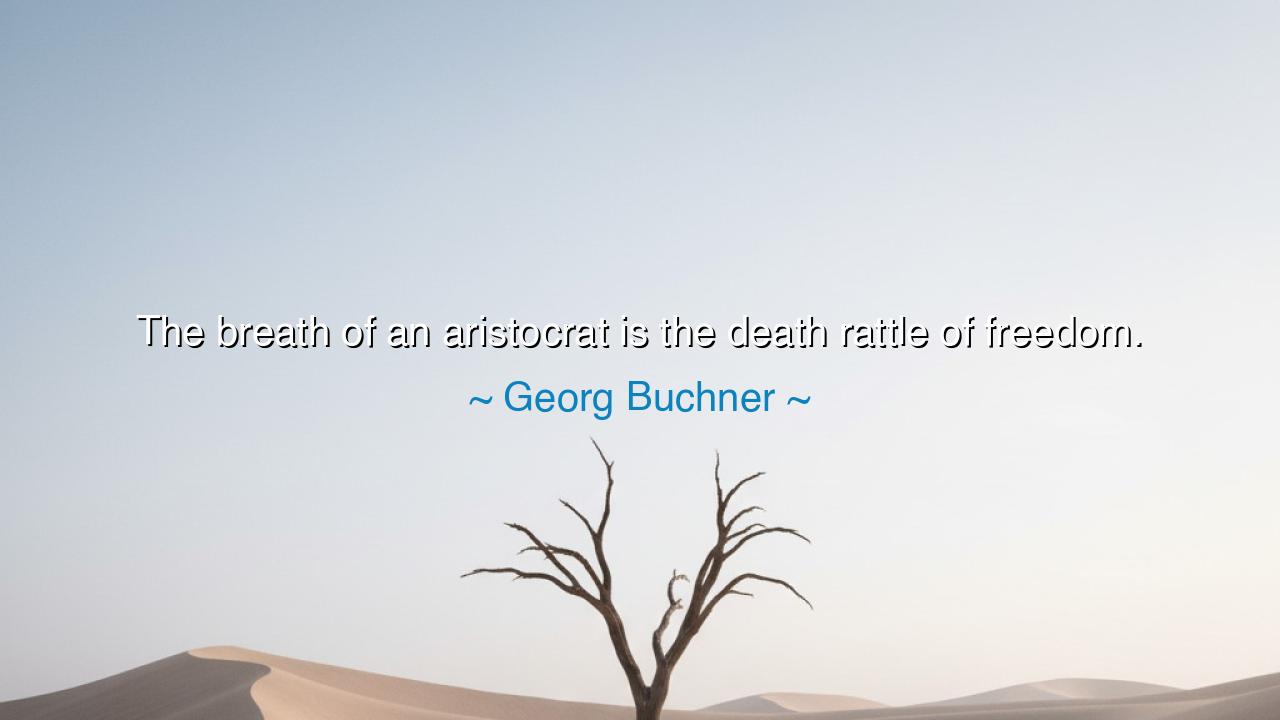
The breath of an aristocrat is the death rattle of freedom.






Host: The evening air was thick with smoke and sirens, the city trembling beneath the weight of its own breathing. The square outside the old parliament building flickered with the orange light of protest fires—banners waving, voices roaring, the hum of unrest moving like electricity through the streets.
From the cracked windows of a nearby café, the chanting could still be heard, muffled but alive. Inside, Jack and Jeeny sat at a corner table, the tabletop littered with newspapers, half-empty cups, and the scent of burnt coffee and fear.
Between them lay a folded leaflet, on which someone had scrawled, in black ink and furious handwriting:
“The breath of an aristocrat is the death rattle of freedom.” — Georg Büchner.
The words sat there, like a loaded gun, small but heavy.
Jeeny: “He wrote that during a revolution, you know. He wasn’t talking about aristocrats in titles—he was talking about aristocrats in spirit.”
Jack: (lighting a cigarette) “Spirit, titles—it’s the same disease. People who think they’re born to rule, to decide what the rest of us should want.”
Jeeny: “But it’s not just them, Jack. It’s us too. Every time we admire them, every time we kneel to power, every time we silence ourselves to fit in. We feed that death rattle.”
Host: Outside, a shout rose, followed by the crash of glass. The flames from a toppled trash can licked the night, painting the walls with a wild, golden fever. Jack’s eyes caught the light; they shone not with fear, but with the old, cold anger of a man who had seen empires rebuild themselves under new names.
Jack: “You really think this is about class, Jeeny? It’s about control. Always has been. Call it aristocracy, elitism, corporate boards, government cabinets—different words for the same throne. You can’t kill what keeps reinventing itself.”
Jeeny: “But that’s exactly why we have to keep fighting. Because every time power changes its mask, freedom has to learn a new language.”
Jack: “And what happens when people get too tired to learn?”
Jeeny: “Then people like you and me remind them why language matters.”
Host: The noise outside rose again—chants, whistles, the crack of a megaphone. A tear gas canister rolled down the street, spinning like a meteor, hissing as it breathed its own toxic truth into the air.
Jack stood, peering out through the foggy glass. His reflection merged with the crowd—the smoke, the faces, the rage—until he seemed both inside and outside the revolt at once.
Jack: “You know what Büchner meant by that quote? He meant that freedom doesn’t die with the sound of chains. It dies with the sound of manners. With the whisper of someone saying, ‘Be reasonable. Don’t make a scene.’ That’s how they win.”
Jeeny: “You sound like you want to burn the palace.”
Jack: (exhaling smoke) “No. I want to close the distance between it and the street. The palace isn’t just a building—it’s a belief. And it’s in every one of us.”
Host: The flames danced in his eyes, and Jeeny could see it then—the fire he’d been trying to bury for years. It wasn’t rage, not exactly. It was grief wearing armor.
Jeeny: “So what do we do? Tear everything down?”
Jack: “Maybe. Maybe we build something smaller. Something that doesn’t need kings or priests or presidents to tell us what freedom should feel like.”
Jeeny: “You think that’s possible?”
Jack: “I think it’s the only thing worth trying for.”
Host: The rain began to fall, softly, smothering the fires outside. The crowd thinned, leaving behind the echo of their voices, the dripping of water, and the scent of burned banners.
Jeeny: “You know, sometimes I think we’re all just aristocrats of the mind. We cling to our own superiority—our opinions, our moralities—and call it freedom.”
Jack: “Exactly. That’s the trap. You start believing you’re the one who gets it, and suddenly you’re the new noble in the room. Everyone else becomes the peasants.”
Jeeny: “So freedom’s not about fighting them. It’s about fighting that tendency in ourselves.”
Jack: “Yeah. Because if you’re not careful, your own voice becomes the death rattle.”
Host: The lights in the café flickered, the power grid straining under the storm. The streets were emptying, but the sky still burned in lightning and smoke.
Jeeny: “Maybe that’s why revolutions always fail, Jack. Because they start by killing kings, and end by crowning new ones.”
Jack: “Yeah. And every crown, no matter how well intentioned, still leaves a bruise.”
Jeeny: “So what do we build instead?”
Jack: (pausing) “A world where no one needs to be an aristocrat to be heard.”
Jeeny: “And what if no one listens?”
Jack: “Then we speak anyway. That’s the only freedom left—to refuse silence.”
Host: The rain beat harder against the windows, a drumbeat of the earth demanding to be heard. The flames were gone, but their afterglow still flickered across the skyline—the light of defiance, of memory, of something too stubborn to die.
Jeeny: “You know, Büchner was only twenty-three when he wrote that. Twenty-three, and he already knew how fragile freedom is.”
Jack: “Because he’d seen what happens when the breath of privilege fills the lungs of power. Everything else starts to suffocate.”
Jeeny: “And yet here we are—still breathing.”
Jack: “For now.”
Host: The camera would have pulled back through the window, the rain streaking down the glass, blurring the figures inside—the revolutionaries of thought, the witnesses of history. The city beyond still smoldered, the Freedom Tower in the distance like a silent sentinel, watching, waiting.
And as the storm swallowed the sound of the streets, one truth lingered—
That freedom doesn’t die in battle,
it dies in etiquette,
in the polite exhale of the privileged,
when the air they breathe
is the same that the rest of us are still
fighting for.






AAdministratorAdministrator
Welcome, honored guests. Please leave a comment, we will respond soon